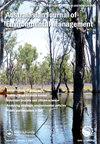Implementing bottom-up governance through granting legal rights to rivers: a case study of the Whanganui River, Aotearoa New Zealand
IF 1.5
4区 社会学
Q4 ENVIRONMENTAL STUDIES
Australasian Journal of Environmental Management
Pub Date : 2022-01-02
DOI:10.1080/14486563.2022.2029775
引用次数: 7
Abstract
ABSTRACT In the context of water management, designing and implementing bottom-up governance regimes that are more sensitive to local knowledge and provide for the direct participation of local actors is of growing interest. Mechanisms that facilitate the successful devolution of authority to local actors remain a challenge, however. This article seeks to understand whether the ‘Rights of Nature’ approach could be a used as a mechanism for transferring decision-making responsibility to local actors. A case study of the Whanganui River, Aotearoa New Zealand, suggests that granting legal rights to nature does help foster more bottom-up governance by using the social norms, customs, traditions, beliefs, and values of individuals within the community to shape the decision-making framework. The analysis highlights the role that local beliefs and customs play in enabling the transfer of decision-making responsibility to lower levels of an institutional arrangement when implementing the ‘Rights of Nature’ approach.通过赋予河流合法权利实施自下而上的治理:以新西兰奥特亚旺加尼河为例
摘要在水资源管理的背景下,设计和实施自下而上的治理制度越来越受到人们的关注,这些制度对当地知识更加敏感,并提供当地行为者的直接参与。然而,促进成功地将权力下放给地方行为者的机制仍然是一个挑战。本文试图了解“自然权利”方法是否可以作为一种将决策责任移交给地方行为者的机制。对新西兰奥特亚旺加尼河的一项案例研究表明,通过利用社区内个人的社会规范、习俗、传统、信仰和价值观来制定决策框架,赋予自然合法权利确实有助于促进更自下而上的治理。该分析强调了当地信仰和习俗在实施“自然权利”方法时,在将决策责任转移到较低级别的制度安排方面发挥的作用。
本文章由计算机程序翻译,如有差异,请以英文原文为准。
求助全文
约1分钟内获得全文
求助全文
来源期刊

Australasian Journal of Environmental Management
ENVIRONMENTAL STUDIES-
CiteScore
2.60
自引率
0.00%
发文量
16
 求助内容:
求助内容: 应助结果提醒方式:
应助结果提醒方式:


